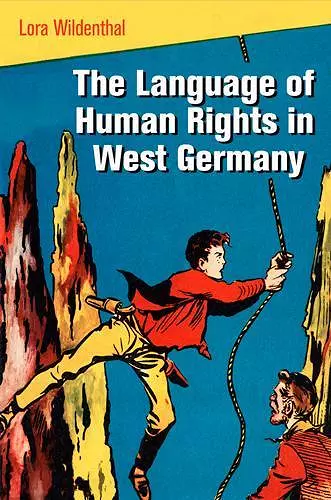The Language of Human Rights in West Germany
Format:Hardback
Publisher:University of Pennsylvania Press
Published:14th Nov '12
Currently unavailable, and unfortunately no date known when it will be back

The Language of Human Rights in West Germany traces the four most important purposes for which West Germans invoked human rights after World War II. Lora Wildenthal demonstrates that human rights comprise a political language, best understood in its own domestic and historical context.
Human rights language is abstract and ahistorical because advocates intend human rights to be valid at all times and places. Yet the abstract universality of human rights discourse is a problem for historians, who seek to understand language in a particular time and place. Lora Wildenthal explores the tension between the universal and the historically specific by examining the language of human rights in West Germany between World War II and unification. In the aftermath of Nazism, genocide, and Allied occupation, and amid Cold War and national division, West Germans were especially obliged to confront issues of rights and international law.
The Language of Human Rights in West Germany traces the four most important purposes for which West Germans invoked human rights after World War II. Some human rights organizations and advocates sought to critically examine the Nazi past as a form of basic rights education. Others developed arguments for the rights of Germans—especially expellees—who were victims of the Allies. At the same time, human rights were construed in opposition to communism, especially with regard to East Germany. In the 1970s, several movements emerged to mobilize human rights on behalf of foreigners, both far away and inside West Germany. Wildenthal demonstrates that the language of human rights advocates, no matter how international its focus, can be understood more fully when situated in its domestic political context.
"In this excellent, precise, and sovereign book, Lora Wildenthal brings new and welcome nuances to the existing historiography and also breaks new ground. . . . An important study that is likely to remain a central reference point for future work not only on the politics of human rights in post-1945 Germany but also on histories of pluralism and civility." * American Historical Review *
"Wildenthal has written an elegant and thoughtful book that makes several major contributions to the history of both human rights and West Germany. By emphasizing the strategic use of human rights language, Wildenthal helps move us away from a focus on abstract norms, and she not only returns questions of agency to the history of human rights but also puts the question of audience at the center of the analysis. . . . This is a new and productive way of thinking about the political culture of postwar Germany." * Journal of Modern History *
"Wildenthal's tightly written study . . . presents the reader with a finely honed and extensively researched analysis that tells the stories of key, yet less well-known, people involved with the postwar development of West German human rights organizations." * Human Rights Review *
"This is a special book: well-grounded, thoughtful, polished, and responsible. Lora Wildenthal has written an important work that goes far beyond the usual praise and will be greatly appreciated as a landmark study about both postwar German history and about human rights history." * Samuel Moyn, Columbia University *
"The crimes of Nazi Germany were one of the major reasons for the spread of the international movement for human rights after World War II, but until now no one has told the story of the movement in Germany itself. Lora Wildenthal does so with erudition and grace, and she shows us how important it is to situate the human rights movement in specific contexts of time and place. Along the way, she brings to light dedicated activists and fledgling organizations that deserve to be restored to history. This is a valuable read for anyone interested in human rights and international justice." * Elizabeth Heineman, Iowa University *
"An elegant and thoughtful book that makes several major contributions to the history of both human rights and West Germany. By emphasizing the strategic use of human rights language, Wildenthal helps move us away from a focus on abstract norms, and she not only returns questions of agency to the history of human rights but also puts the question of audience at the center of the analysis. . . . This is a new and productive way of thinking about the political culture of postwar Germany." * Journal of Modern History *
ISBN: 9780812244489
Dimensions: unknown
Weight: unknown
288 pages